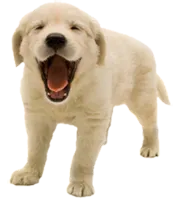In your search for a veterinary facility, we believe you should expect high quality care as well as great service. Our goal has been to assemble a veterinary health care team committed to providing exceptional client service and veterinary health care. Our commitment to you is to continue to offer our world class service and a state of the art veterinary facility.
Your pet's annual vet check-up will include a total physical exam, with a thorough investigation of your pet's head, body and tail, and all his assorted cavities. Because even the most cooperative pet may not readily go-along with a tooth and gum brushing, an annual cleaning by your veterinarian maybe in order. Like you, your pet can lose his teeth due to decay and neglect. It's a good idea to keep an accurate medical diary not only of the procedures and vaccinations your pet receives at the vet, but also of notes on things like your pet's elimination habits and any physical changes or unusual occurrences. Keep track of small shifts in your pet's behavior, including urinary marking habits and mood swings, along with diet and routine modifications. Take this notebook when you visit the vet. These seemingly unrelated occurrences may help explain results of your pet's medical tests. Also, if you need to change vets, it's good to have this journal to provide a complete medical history.
Choose a veterinarian who is calm, compassionate and willing to explain all the procedures your pet undergoes. Try to find a vet with whom both you and your pet feel comfortable. Try to have it convenient, choose a clinic with qualified staff and facilities to undertake surgery and perform procedures requiring anesthesia, such as teeth cleaning. Because of the general risks inherent to anesthesia, especially for very old, very young or very ill pets, your veterinarian will likely suggest a few exams, including a chest X-ray and lab work of blood and urine, before your pet is anesthetized. During the procedure he might need an IV drip; antibiotics may be necessary before and after.
We may refer you to a specialist, veterinarians who have completed advanced studies in specialties such as internal medicine, surgery, and emergency care, if your pet must undergo a procedure that requires more precise knowledge and experience.
Surgery and Anesthesia Procedures
- FOOD/WATER: The night before surgery, you will need to REMOVE ALL FOOD BY 8PM (unless otherwise instructed by clinic staff). Your pet can continue to have water until the time he/she is dropped off unless otherwise instructed by the Veterinarian.
- DAILY MEDICATIONS: The staff will instruct you on whether your pet should receive any of his/her medications prior to surgery. Diabetic pets will be given special instructions.
- SURGERY CHECK-IN: We would like you to arrive at the clinic between 8:00am and 8:15am on the day of surgery. A staff member will collect your information and answer any questions you may have. Your pet’s weight and vital signs are taken at this time. We will also review the scheduled procedure with you.
- PRE-SURGICAL EXAM: Our Veterinarian will perform a comprehensive physical exam on your pet. Any chronic or acute problems will be reviewed at that time. If you have any concerns, you can discuss them with the Vet at this time.
- PRE-ANESTHETIC BLOOD SCREENING: We highly recommend pre-op blood screening to uncover any underlying health concerns that may not have been previously diagnosed. IT IS REQUIRED FOR ANY PET OVER 7 YEARS OF AGE. Our pets are unable to “tell” us when they aren’t feeling well. Blood panels can identify abnormalities with the liver and kidneys prior to undergoing anesthesia that could potential pose problems.
- MONITORING DURING SURGERY: We want your pet’s surgery to be as safe as possible. During the procedure, we use anesthesia monitoring equipment to monitor heart rate and rhythm, breathing and temperature. An experienced Veterinary Technician or Assistant will also physically monitor your pet to keep them comfortable and safe the entire time. Anesthesia is customized specifically for your pet.
- POST-OPERATIVE PERIOD: Your pet is closely monitored immediately after surgery and during the hours following. Some procedures will require an overnight stay, while most pets will go home the same afternoon. Pain control is of utmost importance to us and several options are available both while in clinic and after discharge home.
- DISCHARGE AND FOLLOW-UP CARE: Upon discharge, you will receive detailed instructions on continued care of your pet. Our staff is available to answer any questions during business hours and our Veterinarian is available after hours if you should have any concerns. Any follow-up appointments will be scheduled before you leave. A Veterinary Technician or Assistant will call you within 48 hours of discharge to check on your pet’s progress.
- We want your pet’s experience with us to be as positive as possible and their comfort and safety is our top priority!





